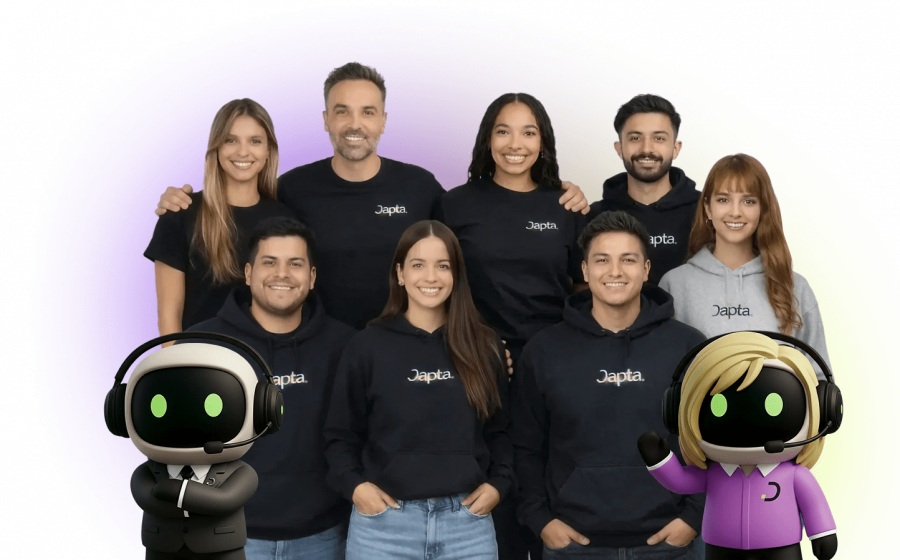- Handle every call
- Provide information
- Book appointments
- Update CRM

Creado para equipos de ventas, marketing y operaciones de PYMEs.













Experimente cómo nuestros agentes de voz con inteligencia artificial gestionan las conversaciones en tiempo real.

Dapta ofrece conversaciones naturales y fluidas. Siempre listo, infinitamente fiable y construido para comprender, responder y actuar en tiempo real.

¡Habla con nuestro agente de IA!
Dapta ayuda a tu empresa a ahorrar tiempo, cerrar más ventas y crecer fácilmente con agentes de texto y voz.
Contacta clientes potenciales, 120 veces más rápido
tiempo de preparación
usuarios

Configúralo todo en segundos. Con una plataforma sencilla, configura tu agente en minutos, integra tus herramientas y observa los resultados en 24 horas.
Configure su agente con instrucciones sencillas basadas en las necesidades de su negocio.
Dile a tu agente qué hacer y estará listo para ponerse manos a la obra.
Conéctese con más de 1.000 herramientas y vea cómo llegan los resultados gracias a una automatización perfecta.













Create a fully custom AI employee without writing a line of code. Describe what you need, and Dapta takes it from there.

Crea un agente de IA personalizado sin usar código. Describe lo que necesitas y Dapta lo construye.
Más productividad. Menos herramientas. Menos herramientas.
Dapta conecta con tus clientes potenciales e identifica al instante a los compradores adecuados, para que puedas centrarte en cerrar tratos sin conjeturas.

Dapta fue una gran victoria para la universidad.
Deja de perder el tiempo en programaciones de ida y vuelta. Deja que tu agente de IA gestione las reservas, envíe recordatorios y mantenga organizado tu calendario, para que puedas centrarte en hacer crecer tu negocio.

Dapta es tan poderosa que preferiríamos quedárnosla para nosotros antes que compartirla.
Obtén ayuda rápida de nuestro equipo de soporte dedicado siempre que la necesites.

Dapta conecta tus herramientas, sincroniza tus datos y automatiza tus flujos de trabajo, para que los equipos de todos los sectores puedan moverse más rápido, cerrar acuerdos más rápidamente y ofrecer mejores experiencias a los clientes.
Los agentes de IA de Dapta hacen un seguimiento instantáneo de los posibles estudiantes, responden a sus preguntas y programan citas, 24 horas al día, 7 días a la semana. Automatiza la captación y mantén tu proceso de matriculación en movimiento sin añadir carga de trabajo adicional a tu equipo.
Convierte cada lead en una oportunidad automatizando demos y flujos de incorporación. Dapta conecta tu CRM, sistemas de pago y herramientas de mensajería para mantener tu canal activo y tus datos precisos.
Dapta responde al instante a consultas de compradores y vendedores, califica los leads y actualiza tu CRM en tiempo real. Ya gestiones 10 propiedades o 1,000, nuestros agentes de IA se aseguran de que ningún trato se pierda.
Desde la calificación instantánea de préstamos hasta comunicaciones seguras con clientes, Dapta optimiza los flujos financieros mientras mantiene tus datos precisos y actualizados. Avanza más rápido, cumple con las regulaciones y brinda a tus clientes una experiencia fluida.
Deja que Dapta gestione las llamadas de entrada, programe las consultas y registre cada interacción automáticamente. Tus clientes obtienen respuestas más rápidas, y tu equipo dedica más tiempo a atender a tus clientes, no a gestionar sistemas.
Ya sea plomería, climatización o jardinería, los agentes de IA de Dapta responden instantáneamente a las solicitudes de los clientes, agendan citas y sincronizan los detalles directamente en tu CRM. Deja de perder oportunidades y empieza a llenar tu agenda automáticamente.
"Dapta ha transformado por completo nuestros flujos de trabajo, ahorrándonos tiempo y aumentando la eficiencia. ¡No puedo no recomendarlo lo suficiente!"
"El apoyo de Dapta ha sido excepcional. Han facilitado enormemente el proceso de integración a nuestro equipo."
"Las herramientas de automatización de Dapta nos permitieron optimizar las operaciones en todos los ámbitos. ¡Las recomiendo firmemente para cualquier empresa en crecimiento!"
"Dapta ha sido increíble para automatizar nuestras tareas de marketing. Es fiable, eficiente y fácil de usar."
"Dapta nos ha ayudado a optimizar nuestras interacciones con los clientes y a automatizar flujos de trabajo clave, mejorando la eficiencia general."
"Dapta ha revolucionado la forma en que gestionamos la atención al cliente y la automatización de ventas. ¡Es una herramienta indispensable!"
"Gracias a Dapta, nuestra agencia funciona mejor que nunca. ¡La automatización de la generación de contenidos nos ha ahorrado mucho tiempo!"
"¡Con la IA de Dapta, hemos optimizado nuestros procesos de ventas y potenciado la generación de clientes potenciales sin esfuerzo!"
"Nuestra eficiencia empresarial se disparó tras integrar Dapta. La plataforma es fácil de usar e increíblemente eficaz."
"Las herramientas de automatización de Dapta han supuesto un gran cambio para nosotros. Ahora son una parte esencial de nuestras operaciones diarias."
"Dapta ha hecho que la automatización de nuestras tareas de marketing sea sencilla y eficaz. ¡Ha sido un cambio radical para nosotros!"
"Dapta nos permite manejar los problemas de los clientes 24/7, garantizando soporte continuo y una resolución más rápida para cada caso."

Sabemos que adoptar la IA puede parecer intimidante — por eso estamos aquí para hacerlo simple. No seas el último en comenzar.
Elige el plan que se ajuste a tus necesidades y presupuesto.
Forma a los agentes e integra los flujos de trabajo
Libera todo el potencial de la IA para ampliar tu negocio.
Libera todo el potencial de la IA para ampliar tu negocio.
El AI Call Agent responde al instante. El AI Voice Agent puede llamar a un lead segundos después de que envía un formulario o solicita contacto.
¡Absolutamente! Dapta se integra de manera nativa con más de 300 herramientas y también puede conectarse a tus APIs favoritas. Ya sea tu CRM, plataforma de marketing por correo electrónico o herramienta de gestión de proyectos, Dapta te ayuda a crear flujos de trabajo sin esfuerzo.
¡Estamos aquí para ti las 24 horas, los 7 días de la semana! Contáctanos en cualquier momento a través de support@daptatech.com o utiliza el chat en vivo en nuestro sitio web. Nuestro equipo está listo para ayudarte con lo que necesites.
Las llamadas de IA son llamadas telefónicas automatizadas y impulsadas por IA que manejan tareas como la calificación de leads, el seguimiento de clientes y la prospección. Estas llamadas suenan naturales, involucran a su audiencia de manera efectiva y ayudan a ahorrar horas de trabajo manual a su equipo.
El chatbot Dapta es un asistente impulsado por IA que interactúa con los clientes las 24 horas, los 7 días de la semana. Puede responder preguntas frecuentes, recopilar contactos y guiar a los usuarios a través de tu embudo de ventas. Sus avanzadas habilidades conversacionales aseguran interacciones similares a las humanas que dejan una gran impresión.